|
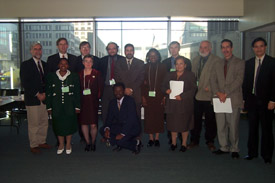 During
the closing Plenary, regional groups then presented their
nominations for the SBSTTA Bureau. Delegates elected Dehui Wang
(China), Grace N.W. Thitai (Kenya), Lily Rodriguez (Peru), Paula
Warren (New Zealand) and Peter Straka (Slovakia). Raed Bani Hani
(Jordan), Renato Rimoli (Dominican Republic), Anastasios Legakis
(Greece) and Koffi Edinam Dantsey (Togo), and Jan Plesnick (Czech
Republic) will remain in office as Bureau members. On the draft
provisional agenda for SBSTTA-7, the Secretariat introduced UNEP/CBD/SBSTTA/6/13.
TOGO, on behalf of the African Group, proposed moving marine and
coastal biodiversity from SBSTTA-9 to SBSTTA-7. After some
discussion, delegates agreed that the SBSTTA Bureau would consider
the issue as a substantive element for SBSTTA-8. Delegates adopted
the dates and venue of SBSTTA-7, which are 12-16 November 2001, in
Montreal. During
the closing Plenary, regional groups then presented their
nominations for the SBSTTA Bureau. Delegates elected Dehui Wang
(China), Grace N.W. Thitai (Kenya), Lily Rodriguez (Peru), Paula
Warren (New Zealand) and Peter Straka (Slovakia). Raed Bani Hani
(Jordan), Renato Rimoli (Dominican Republic), Anastasios Legakis
(Greece) and Koffi Edinam Dantsey (Togo), and Jan Plesnick (Czech
Republic) will remain in office as Bureau members. On the draft
provisional agenda for SBSTTA-7, the Secretariat introduced UNEP/CBD/SBSTTA/6/13.
TOGO, on behalf of the African Group, proposed moving marine and
coastal biodiversity from SBSTTA-9 to SBSTTA-7. After some
discussion, delegates agreed that the SBSTTA Bureau would consider
the issue as a substantive element for SBSTTA-8. Delegates adopted
the dates and venue of SBSTTA-7, which are 12-16 November 2001, in
Montreal.
Above photo: Incoming and outgoing SBSTTA Bureaux of the CBD
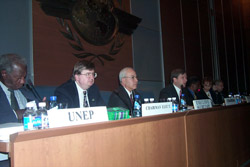 During
discussion on other matters, Chair Samper introduced a
recommendation on the Global Biodiversity Outlook (GBO), which
notes work made to date, and requests Parties and others to
provide comments on the draft of the GBO to the CBD Executive
Secretary by 30 April 2001. The recommendation was adopted without
comment. VENEZUELA, with ECUADOR, requested a note in the
meeting's report proposing further examination of biological
control agents to eradicate crops. During
discussion on other matters, Chair Samper introduced a
recommendation on the Global Biodiversity Outlook (GBO), which
notes work made to date, and requests Parties and others to
provide comments on the draft of the GBO to the CBD Executive
Secretary by 30 April 2001. The recommendation was adopted without
comment. VENEZUELA, with ECUADOR, requested a note in the
meeting's report proposing further examination of biological
control agents to eradicate crops.
Left photo: The dias of the SBSTTA-6 closing plenary.
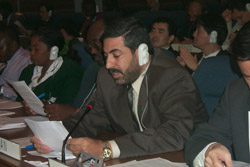 Recommendations
regarding the reports to Plenary on ad hoc technical expert
groups, inland water biodiversity and marine and coastal
biodiversity were adopted after some discussion. Recommendations
regarding the reports to Plenary on ad hoc technical expert
groups, inland water biodiversity and marine and coastal
biodiversity were adopted after some discussion.
WG-II Chair Banihani (right) reported on the activities of WG-II, noted the spirit of
cooperation, and introduced draft recommendations UNEP/CBD/ SBSTTA/6/L.7/Add.1
– Add.4 and UNEP/CBD/SBSTTA/6/L.7, the report of WG-II, which
were adopted with minor editorial changes. The report of the
working group was adopted with an addition from the NETHERLANDS
noting general concern that references to financial resources in
the recommendations were not in harmony with COP Decision IV/16,
paragraph 13.
WG-I Chair Legakis then reviewed WG-I's
deliberations and presented its recommendations. Chair Samper
noted that the GPs are not legally-binding and that some issues,
which are beyond SBSTTA's mandate, will be referred to COP-6 for
resolution. After extensive discussion, Plenary adopted WG-I's
recommendations UNEP/CBD/SBSTTA/6/L.6, Add.1 and Add.2, and the
report of WG-I in UNEP/CBD/SBSTTA/6/L.6.
Delegates
adopted the report of the meeting, UNEP/CBD/SBSTTA/6/L.1, without
amendment. In assessing SBSTTA-6's experimental modus
operandus, Chair Samper noted that: information documents
should be provided ahead of time and better linked to agenda
items; the number of presentations should be reduced and made
available through side events; more time should be devoted to
drafting recommendations; and side events should continue to be
arranged. Several developing countries proposed time and funds for
regional group meetings prior to SBSTTA sessions. CANADA noted
that some presentations were too basic and others needed to be
more targeted, and suggested that relevant information be made
available through CHM prior to meeting. The NETHERLANDS
complimented such assessment as a process of translating the
negative into positive. Chair Samper welcomed further feedback
from participants for consideration by the SBSTTA Bureau.
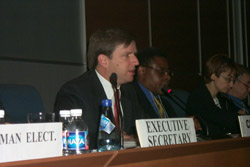 Chair Samper
(left) noted SBSTTA's evolution in serving as a forum to exchange
information and build bridges between science and politics,
especially with regard to the issues of invasive species and
climate change. He highlighted five essential aspects for the
future: the long term view and approach to the CBD; ways to
improve the structure of work programs by stressing priorities;
adhering to the terms of reference in scientific and technical
assessments; better coordination between the CHM and SBSTTA; and
continuing the process of building bridges to other conventions to
promote linkages and avoid duplication. Jan Plesnik expressed
thanks to Chair Samper and said he would continue the process of
making SBSTTA more operational, effective, and appropriate in
preparing for SBSTTA-7. Chair Samper
(left) noted SBSTTA's evolution in serving as a forum to exchange
information and build bridges between science and politics,
especially with regard to the issues of invasive species and
climate change. He highlighted five essential aspects for the
future: the long term view and approach to the CBD; ways to
improve the structure of work programs by stressing priorities;
adhering to the terms of reference in scientific and technical
assessments; better coordination between the CHM and SBSTTA; and
continuing the process of building bridges to other conventions to
promote linkages and avoid duplication. Jan Plesnik expressed
thanks to Chair Samper and said he would continue the process of
making SBSTTA more operational, effective, and appropriate in
preparing for SBSTTA-7.
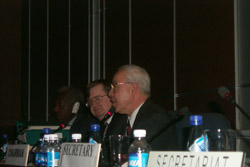 Executive
Secretary Hamdallah Zedan (right) stated that SBSTTA-6 has been successful
despite a challenging agenda. He noted that SBSTTA continues to
evolve as the authority of scientific technical and technological
advice in the UN system, demonstrating the important role it plays
in implementing CBD objectives. He thanked all for their
commitment, support and guidance, and also thanked CIDA and the
government of Quebec for their renewed financial support. Executive
Secretary Hamdallah Zedan (right) stated that SBSTTA-6 has been successful
despite a challenging agenda. He noted that SBSTTA continues to
evolve as the authority of scientific technical and technological
advice in the UN system, demonstrating the important role it plays
in implementing CBD objectives. He thanked all for their
commitment, support and guidance, and also thanked CIDA and the
government of Quebec for their renewed financial support.

REAL AUDIO TO FOLLOW
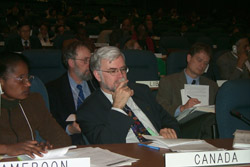 Closing
statements of appreciation were also given by: CANADA; TOGO
(African region); IRAN (Asian group), who also emphasized lack of
adequate time to review preparatory documents and organize
meetings; POLAND (Central and Eastern Europe); and GREENPEACE
INTERNATIONAL, who encouraged all to understand the importance of
forests in looking to SBSTTA-7. Closing
statements of appreciation were also given by: CANADA; TOGO
(African region); IRAN (Asian group), who also emphasized lack of
adequate time to review preparatory documents and organize
meetings; POLAND (Central and Eastern Europe); and GREENPEACE
INTERNATIONAL, who encouraged all to understand the importance of
forests in looking to SBSTTA-7.
Above photo: David Brackett (Canada) gave closing statements of
appreciation during the closing plenary of SBSTTA-6
Chair Samper then officially closed SBSTTA-6 at 6:30 pm.
|